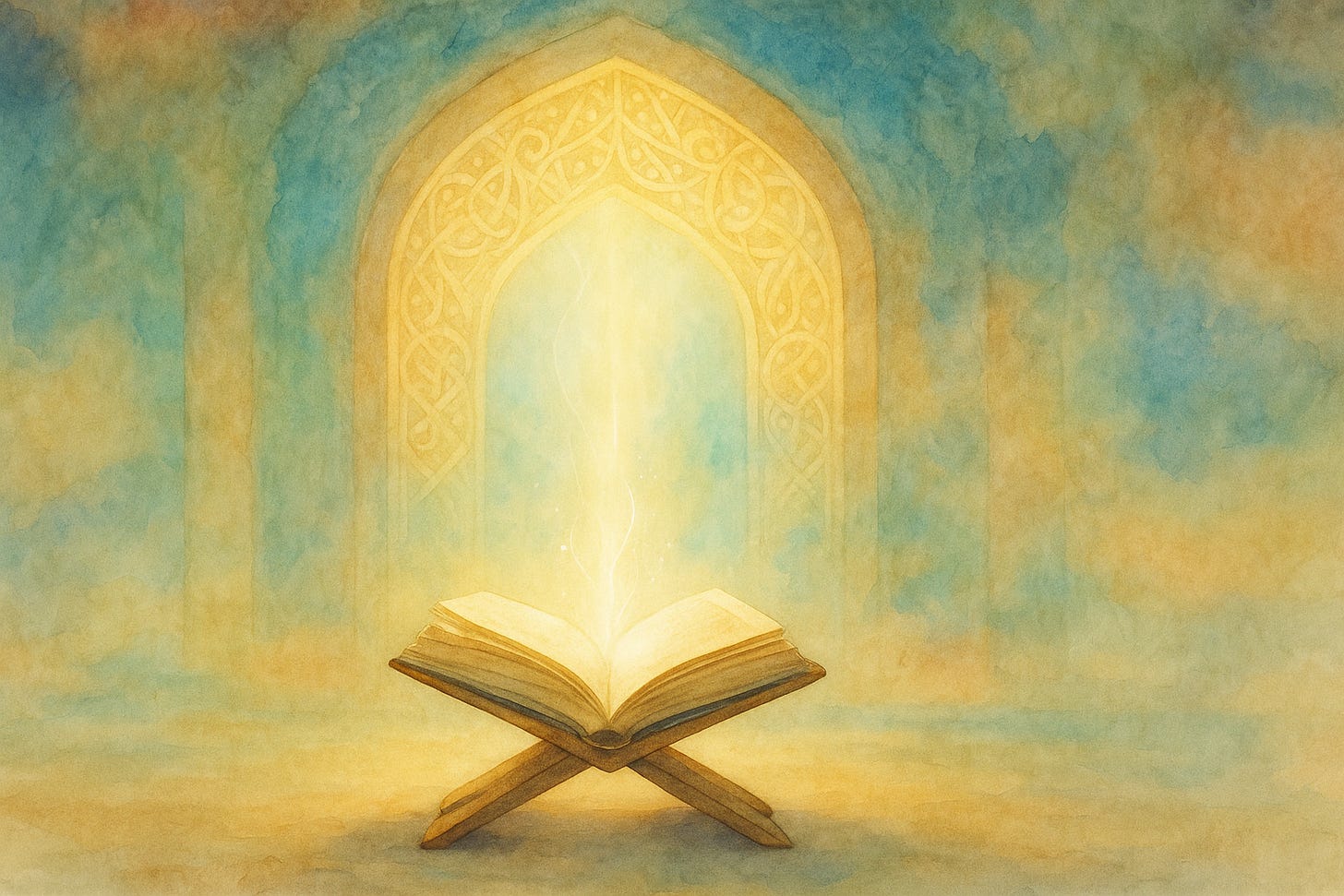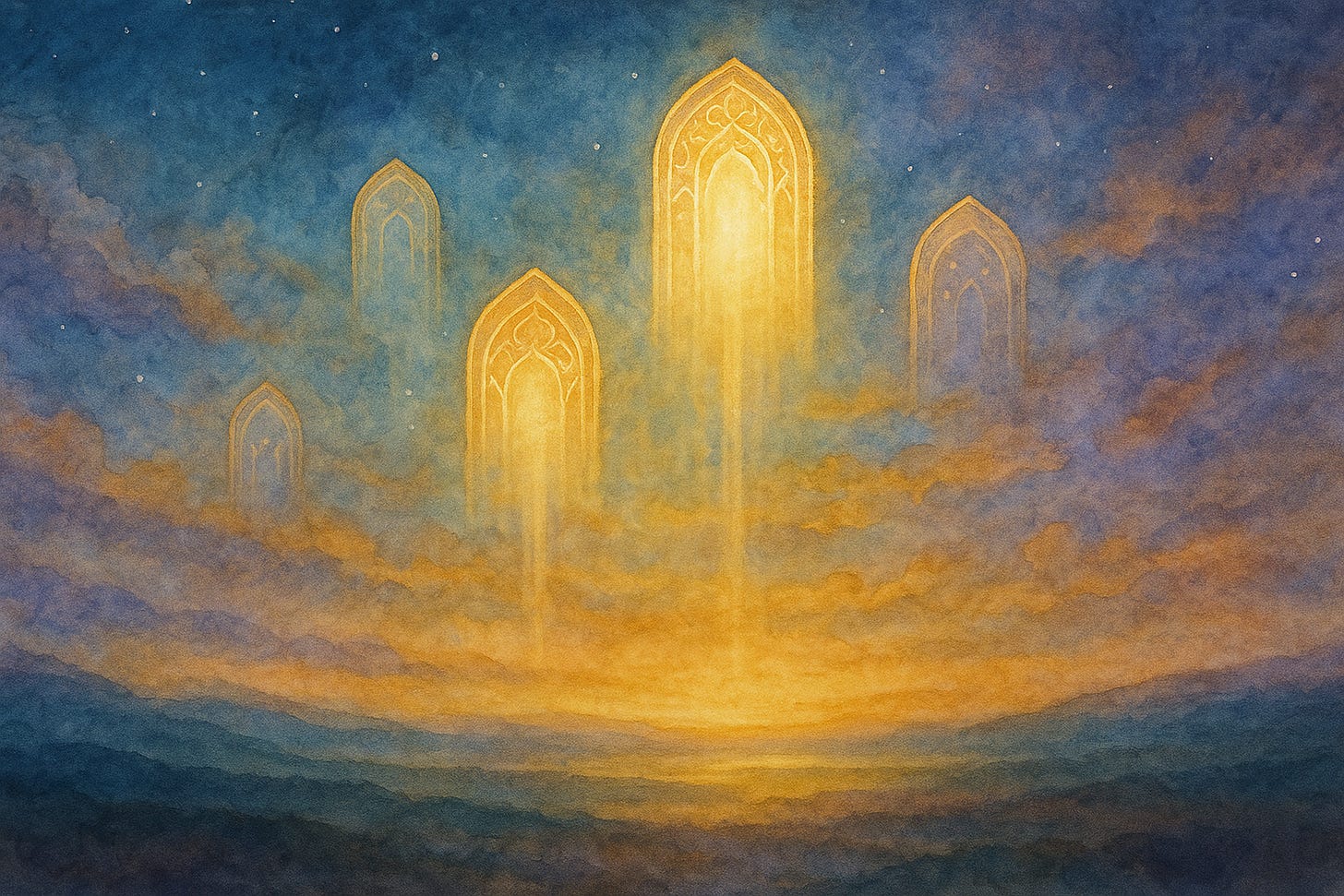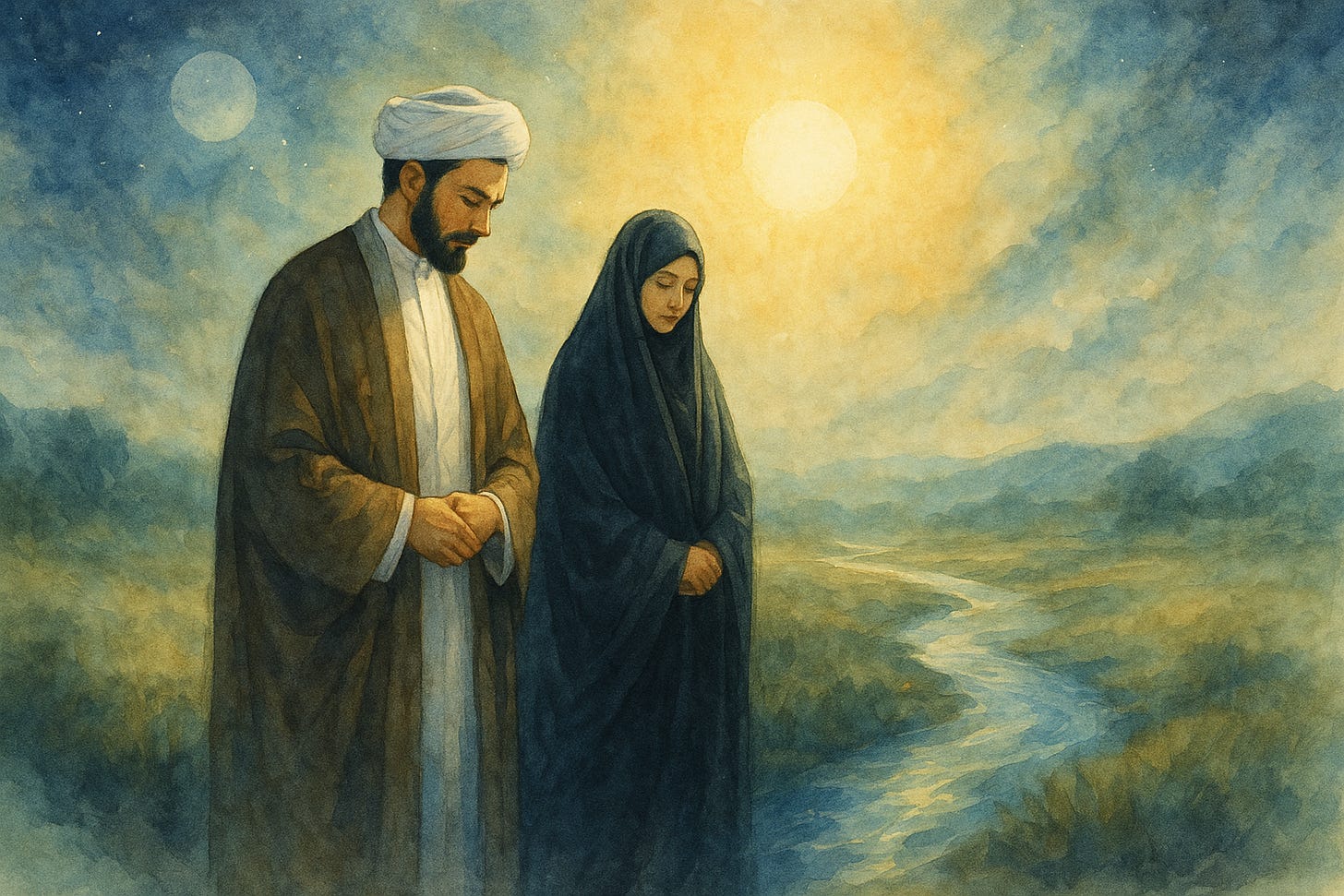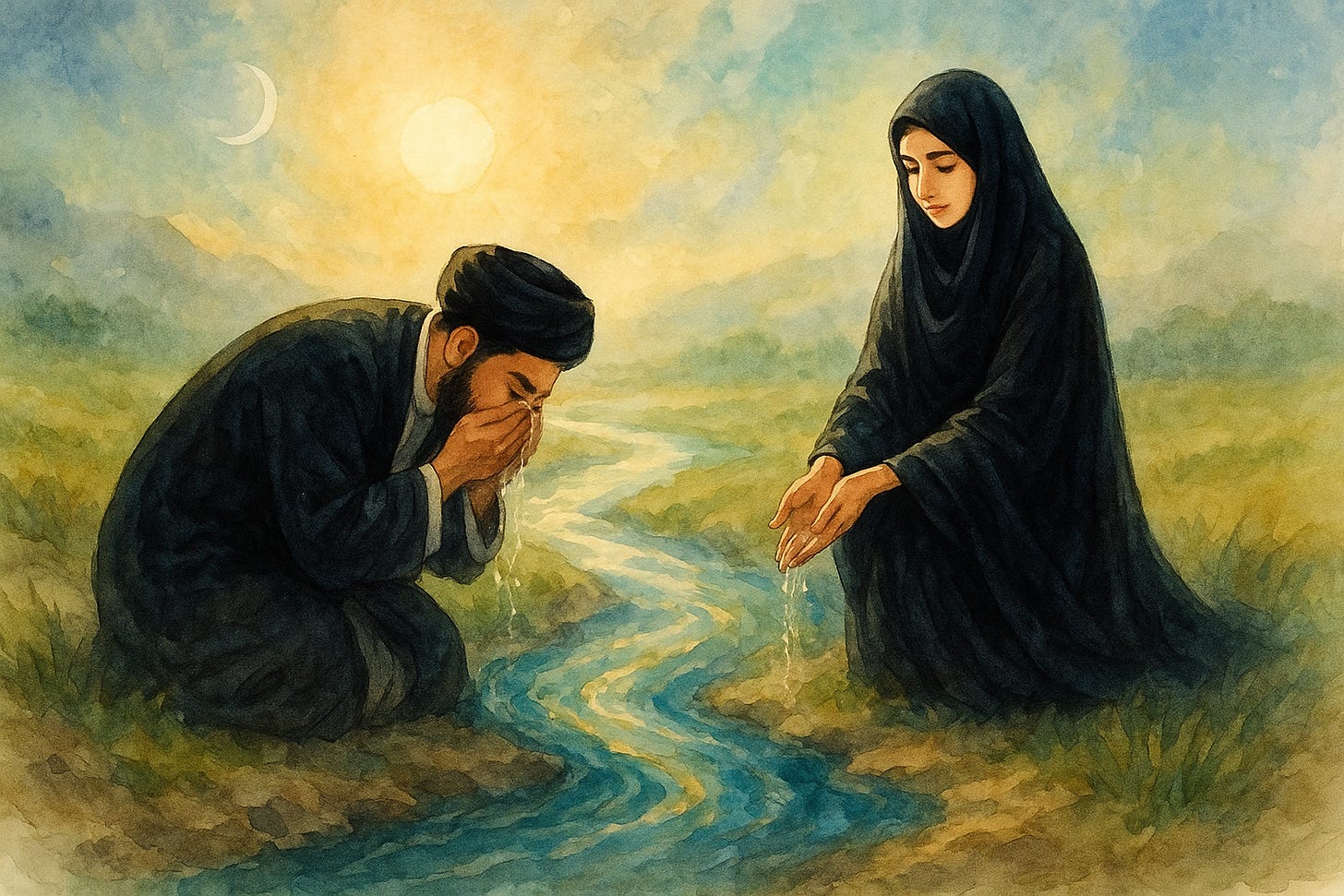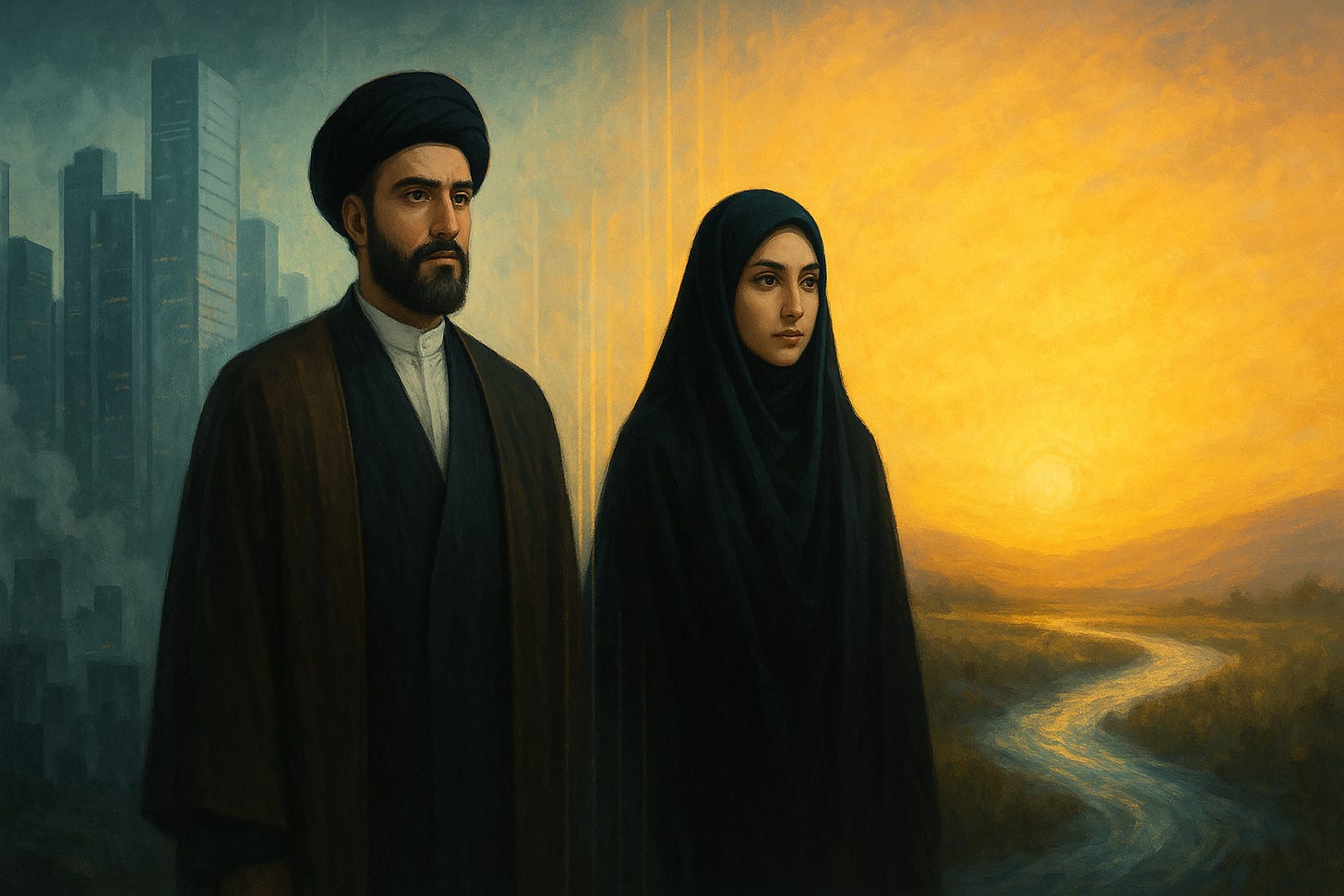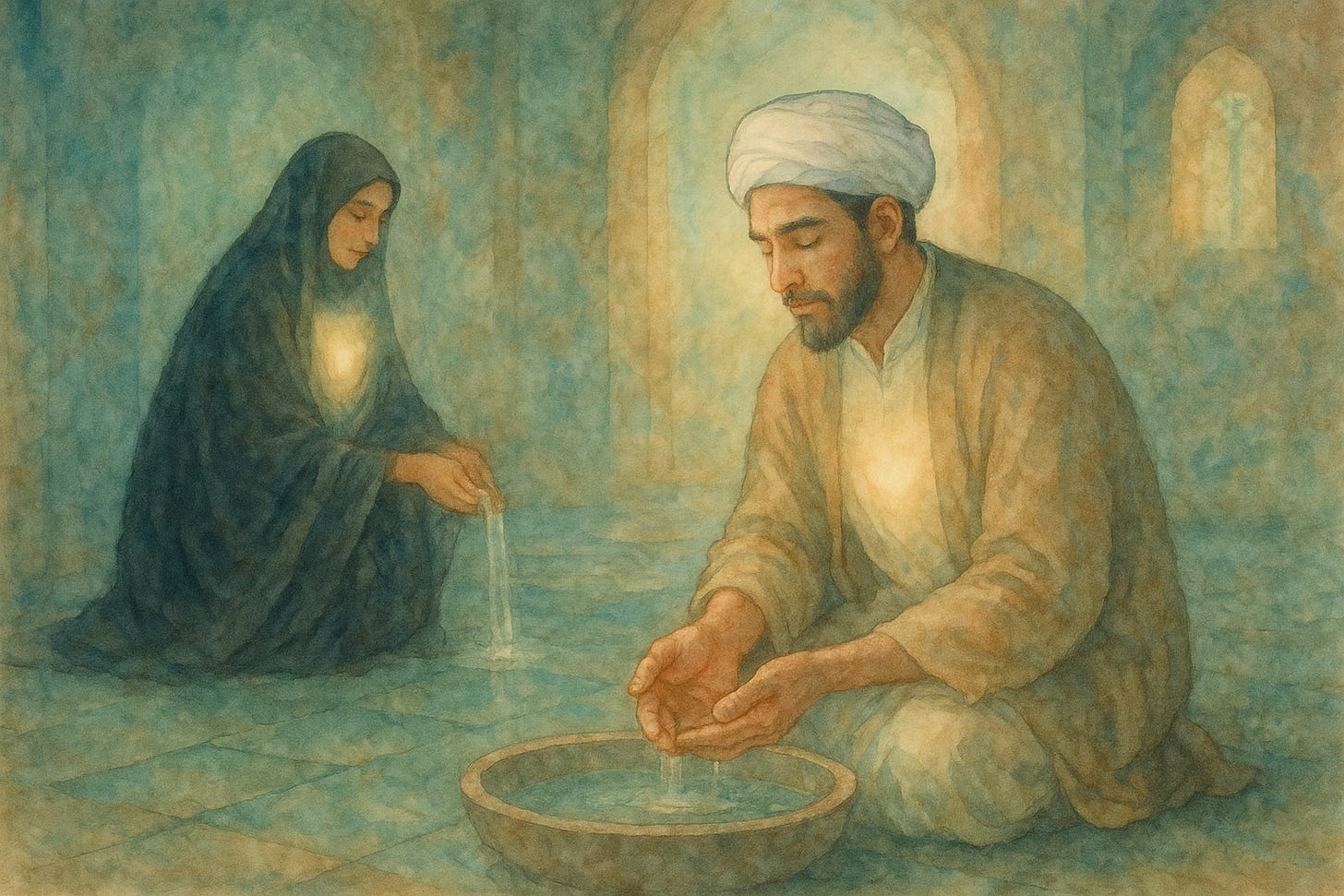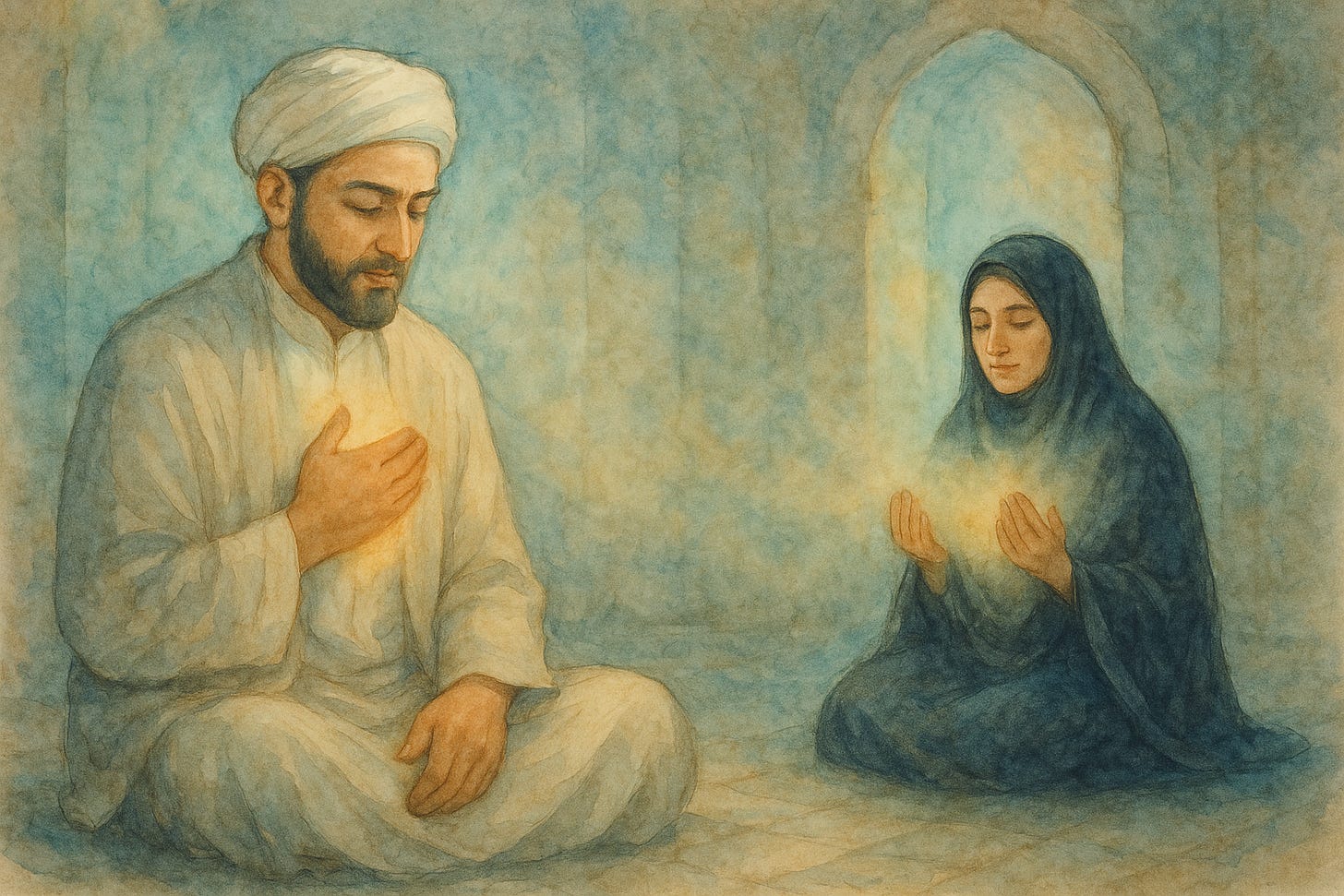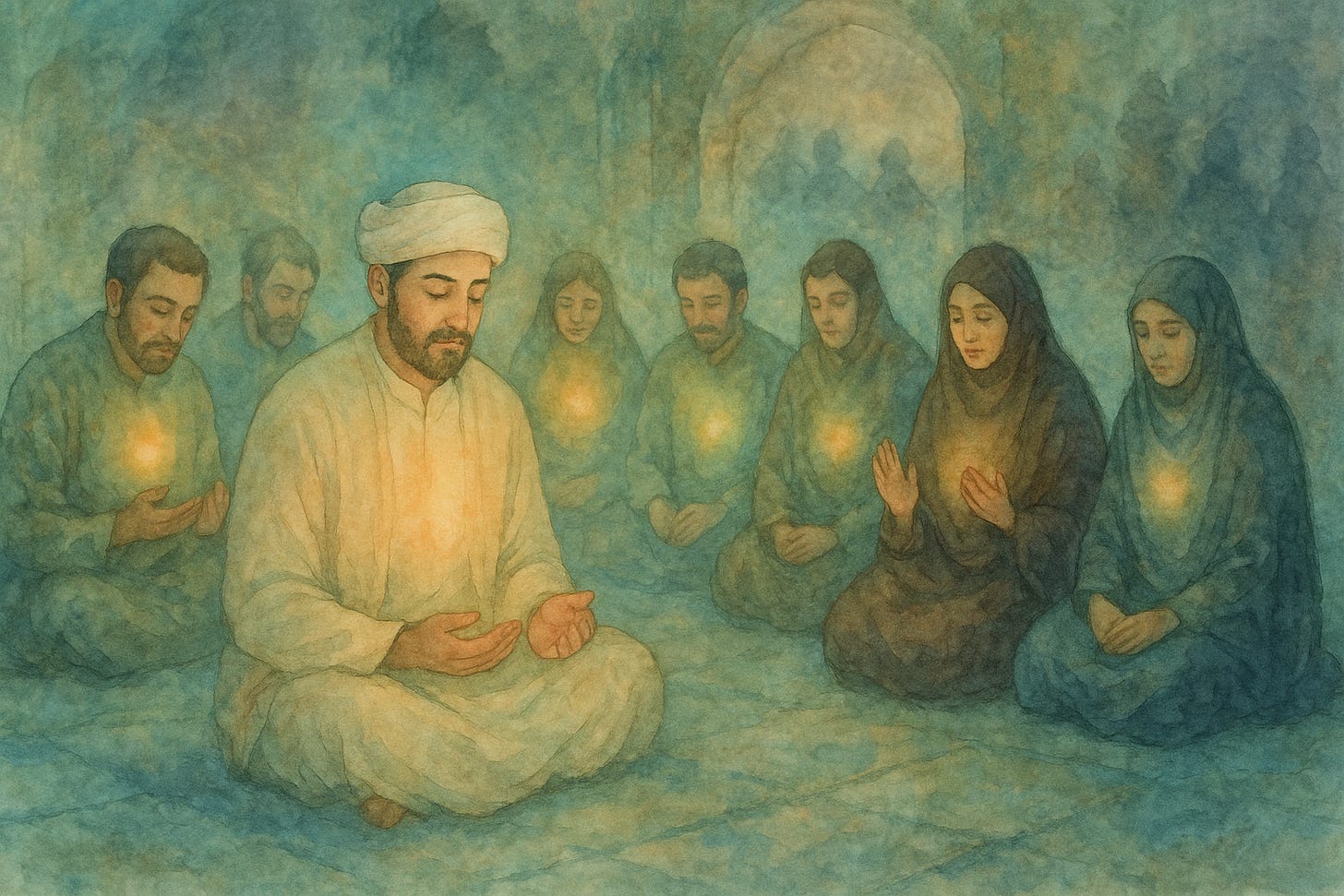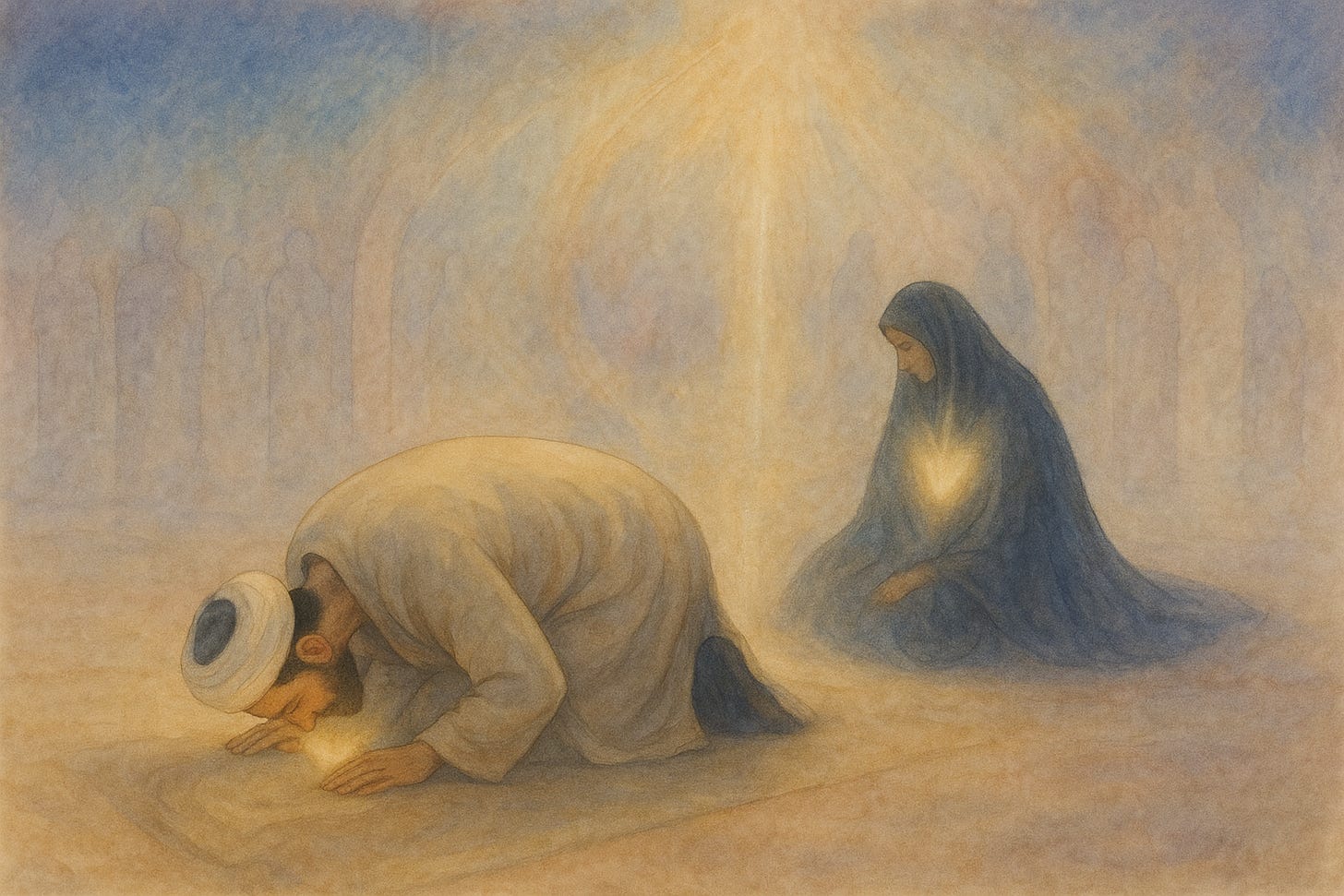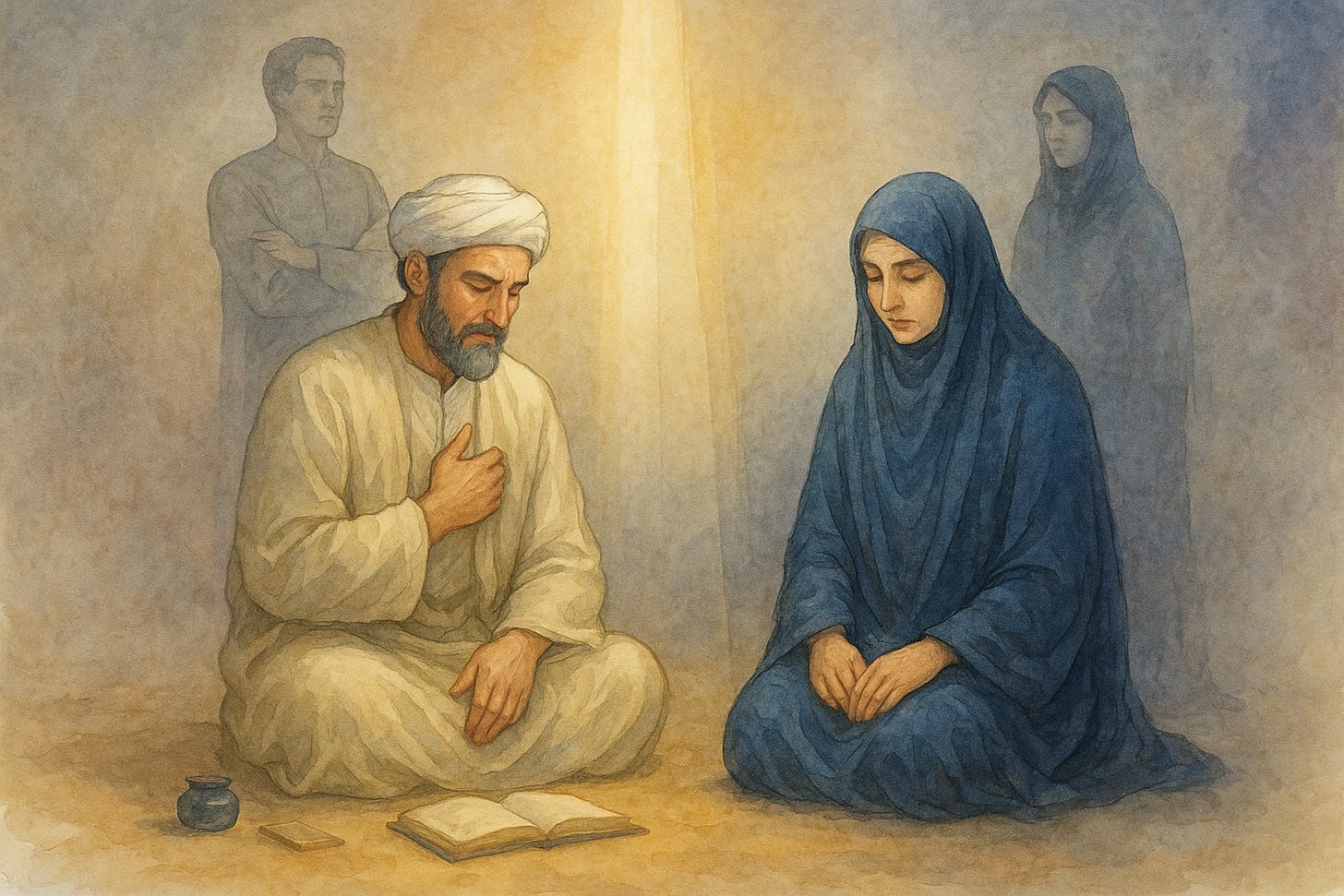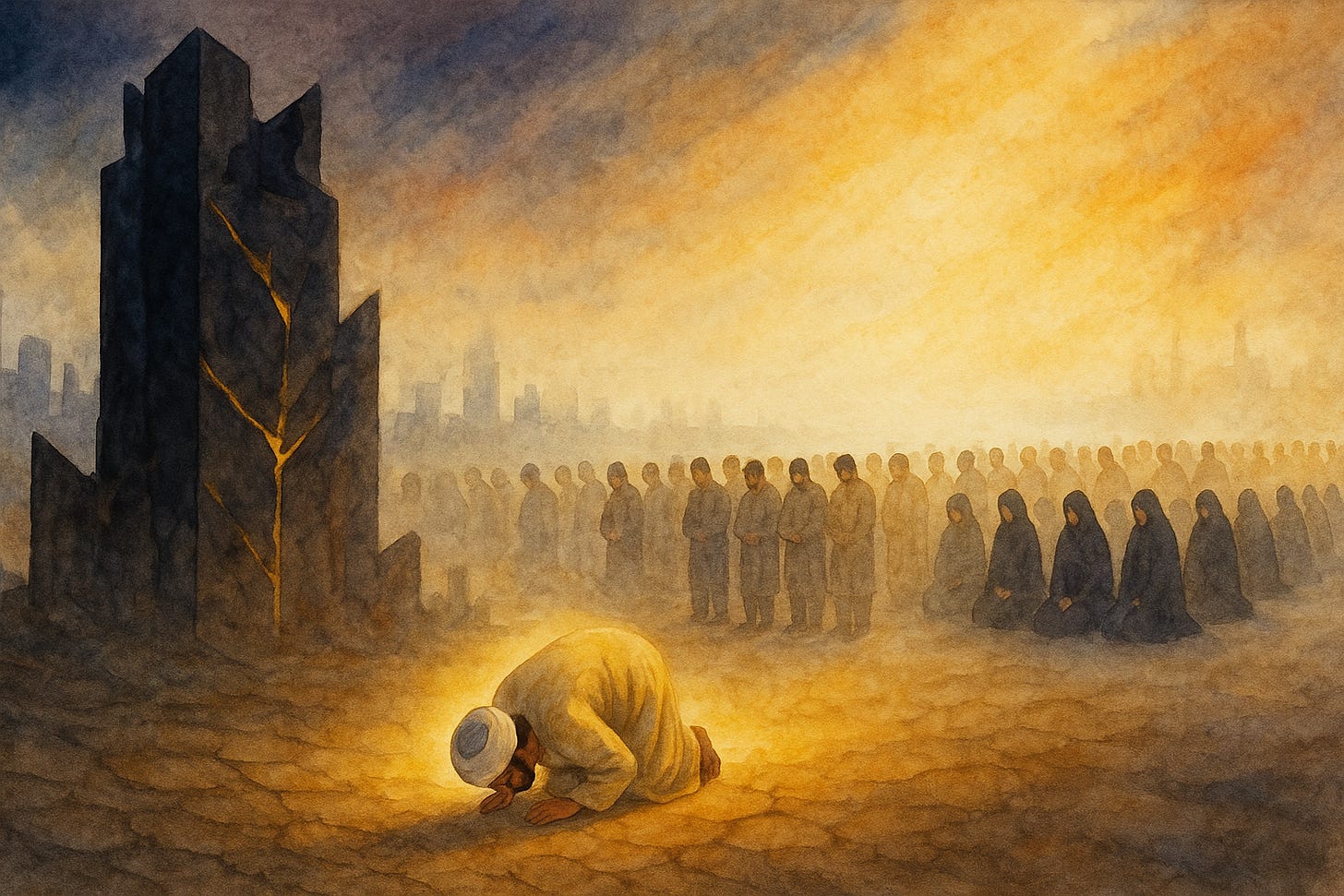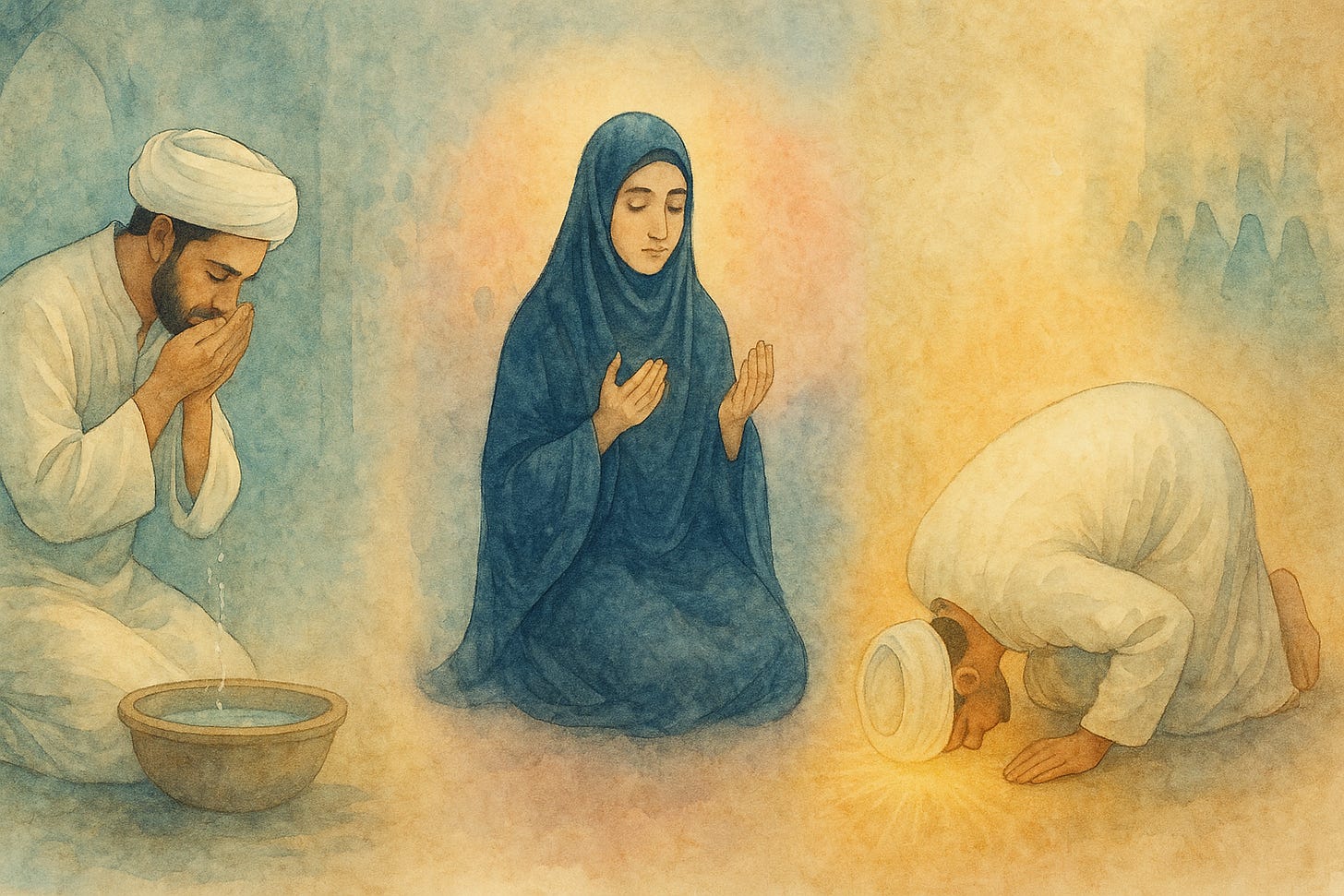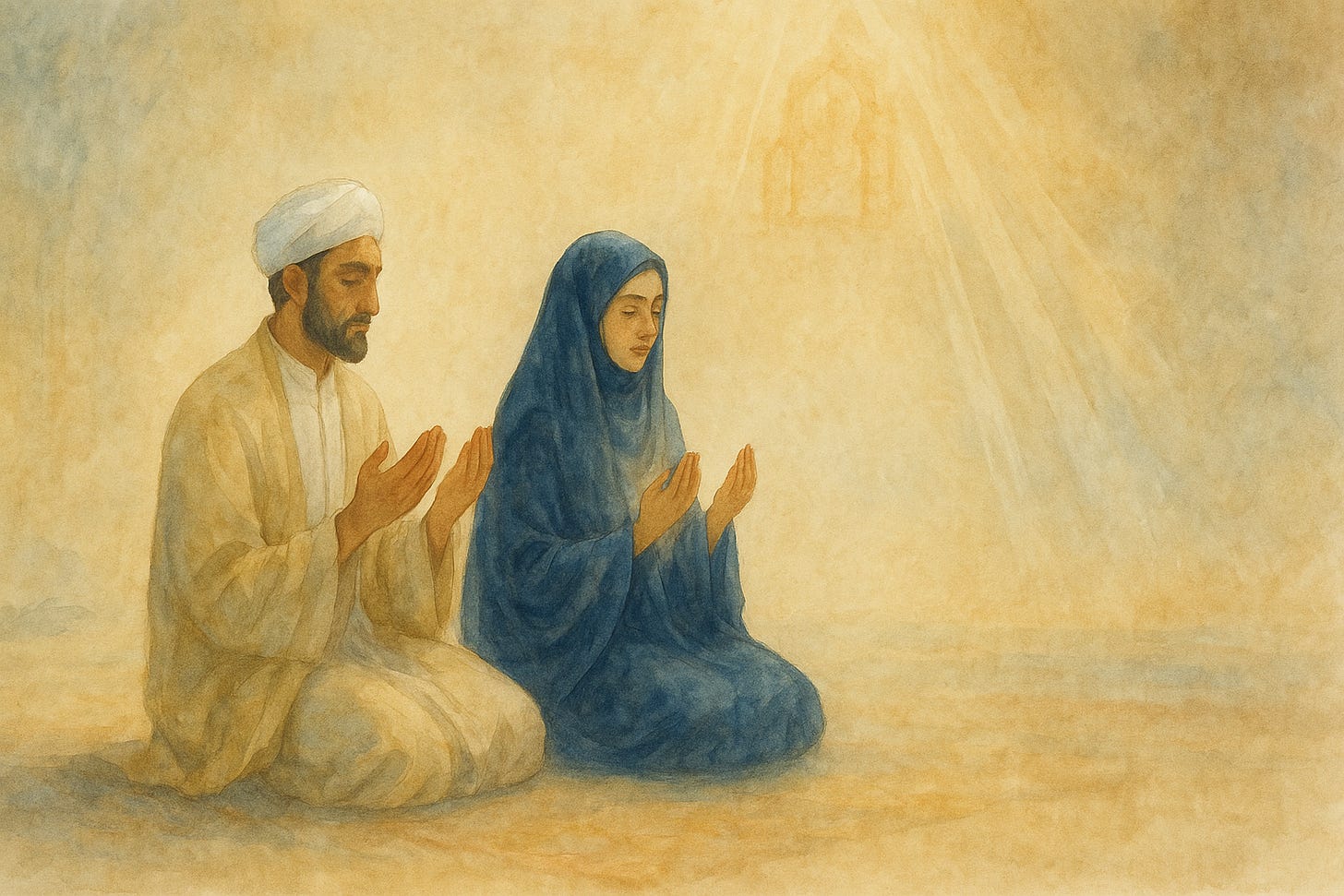[21] The Art of Supplication - The Heart of the Matter - Part 1 - The Prerequisite of Purity (Tazkiyah & Taharah)
A series of discussions based on the book Uddat al-Dai wa Najah as-Saee - The Provision of the Supplicant, and the Triumph of the Seeker by Ibn Fahd al-Hilli on the subject of Supplication and Prayer.
In His Name, the Most High
This is the twenty-first part of our series, The Art of Supplication, an ongoing exploration into the sacred relationship between the supplicant, the supplication, and the Divine.
The insights within this series are cumulative, and the nature of our discussion requires that each part build upon foundations laid in the ones that came before.
To prevent any misunderstanding and to fully benefit from the depth of this subject, it is essential that you engage with the previous parts in order before continuing with this one.
The previous parts in this series can be found here:
Video of the Majlis (Sermon/Lecture)
This write up is a companion to the video majlis (sermon/lecture) found below:
Audio of the Majlis (Sermon/Lecture)
This write up is a companion to the audio majlis (sermon/lecture) found below:
Recap
The Sacred Windows: A Recap of Time and Place
Our journey through “The Art of Supplication” revealed how Time and Place act as Sacred Windows, divinely appointed opportunities where the veils thin and God’s mercy descends more abundantly. We learned that these windows are not where God is more present, but where we become more receptive, guided by a sacred map patterned by Divine wisdom.
The Sacred Windows: The Role of Time
Our exploration first charted the sacred rhythms of Time, discovering it not as an empty corridor but a living vessel patterned with moments for repentance, renewal, and drawing nearer to the Divine.
Foundational Rhythms: The Daily & Weekly Pulse
Our path began with the most intimate cycles:
The Pre-Dawn Hour (Sahar): That profound stillness before dawn, a time of solitude and forgiveness, when heavenly gates open – a daily rehearsal for Qiyamah.
The Weekly Rhythm: An ascent marked by:
The Night of Wednesday: A time for seeking nearness through Tawassul, approaching God via His chosen means, the Prophet and Ahl al-Bayt.
The Night and Day of Friday: The Sayyed al-Ayyam (Master of Days), a peak of mercy, forgiveness, and answered prayers, where the communal gathering rehearses the Day of Judgement.
Together, these rhythms teach that time is a trust, patterned by mercy, inviting the believer into a life of remembrance and anticipation.
The Grand Cycle: The Yearly Map of Mercy and Allegiance
From the weekly pulse, we ascended to the grand tapestry of the year, uncovering a profound architecture built around Divine Mercy, the Covenant of Wilayah, and the Arc of Loyalty.
Seasons of Divine Mercy: We mapped foundational stations:
Rajab: The “Month of God,” a sacred threshold where mercy pours.
15th of Sha’baan: A bridge-night of vast forgiveness and the hopeful birth of Imam al-Mahdi.
Month of Ramadhan & Nights of Qadr: The spiritual axis, centred on the Qur’an’s descent, culminating in nights better than a thousand months when destinies are sealed in the presence of the living Imam.
Mab’ath (27th Rajab): The dawn of Prophethood, when the command “Read!” initiated the mission to perfect noble character.
Dahw al-Ardh (25th Dhul Qadah): The cosmic anniversary when the earth was spread from beneath the Ka’bah, setting the stage for creation’s worship.
The Covenant of Wilayah: We witnessed the establishment of Divine Guardianship through three movements:
Mubahela: The living testimony, where the purity of the Ahl al-Bayt stood as irrefutable proof.
Ghadir: The solemn proclamation, completing the religion by establishing the unbroken chain of Imamate.
Eid al-Zahra: The joyful renewal, marking the start of the Imamate of our living Imam, transforming sorrow into forward-looking hope.
The Arc of Loyalty: We learned how the covenant is tested and affirmed through trial and sacrifice:
Arafah: The day of recognition (ma’rifah), confronting our essential poverty to receive God’s infinite mercy.
Ashura: The day of sacrifice, when loyalty bled onto the sands of Karbala, defined by Imam al-Husayn’s cry: “Hayhat minna al-dhillah!” (Far from us is humiliation!).
Arbaeen: The day of return, when grief walks and transforms into a global mission, renewing the covenant with every step.
Completion & Witness: The year is sealed with divine verdicts and reminders:
The Great Eids (Fitr & Adha): Divine judgements of acceptance after striving – Fitr marking the return to purity, Adha the summit of submission echoing the “Great Sacrifice.”
The White Days (Ayyam al-Baydh): Monthly training in reflecting the divine light, like the full moon, preparing the soul for the Age of Occultation.
The Days of God (Ayyam Allah): Decisive, visible interventions in history – past and present – shattering illusions and proving God as the ultimate Actor.
Our journey through sacred time revealed a complete spiritual syllabus, training the heart in remembrance, gratitude, loyalty, sacrifice, and active anticipation for the greatest Day of God: the return of the Imam of our Time.
The Sacred Windows: The Role of Place
Having understood Time as a sacred map, our focus turned to the holy ground upon which this sacred history unfolded, guided by the principle that “When the earth becomes the place of Divine manifestation, it becomes the descent-point of mercy and the sanctuary of worship.”
Foundational Sanctuaries: Makkah, Madinah, Al-Quds
Our path began at the Qur’an’s foundational geography:
Makkah (Masjid al-Haram): The Primordial Sanctuary, the axis from which creation spread, the eternal Qiblah orienting all bodies and souls, mirroring the ultimate sanctuary: the believer’s purified heart.
Madinah (Masjid al-Nabi): The Luminous Sanctuary, where revelation became community, founded on taqwa and ithaar, the blueprint for a society wedding worship and justice.
Al-Quds (Masjid al-Aqsa): The Covenantal Bridge, linking all prophets, its sanctity a global symbol of justice and a measure of the Ummah’s integrity.
These three anchor points established that the earth is not passive but a living witness, consecrated by divine acts.
Sanctuaries Forged in Trial, Allegiance, and Preservation
Our journey then took us through a profound syllabus etched onto the land:
The Triangle of Iraq:
Kufa: The Crucible of the Covenant, teaching the painful price of hesitation and the chasm between admiration and active allegiance (bay’ah).
Karbala: The Criterion of Truth, where Imam Husayn wrote the grammar of Wilayah in blood, teaching the unity of love (salaam) and disavowal (bara’ah).
Najaf: The Citadel of Preservation, fortress of guardianship built around the Gate of Knowledge, Imam Ali, anchoring the Hawza and the covenant of Marja’iyyah.
The Sanctuaries of the Heart (Iran):
Mashhad: The Sanctuary of Mercy, home to Imam al-Ridha, the Gharib al-Ghuraba and Dhamin al-Ahu, whose compassion flows institutionally.
Qom: The Garden of Loyalty, founded upon the fidelity of Sayyedah Ma’soumeh, proving feminine sanctity shapes civilisations and that true intercession (shafa’ah) empowers loyalty.
Graveyards of the Martyrs: The Pedagogy of Death, teaching that the shuhada (witnesses) are truly alive, correcting our fear calculus through the certainty (yaqin) of figures like Maytham al-Tammar.
Thresholds of Concealment & Continuity:
Kadhimiyyah: The Sanctuary of Imprisoned Light, where Imam al-Kadhim turned dungeons into prayer niches (mihrab), challenging the community’s allegiance.
Samarra: The Portal to the Unseen, threshold of the Great Occultation, teaching that waiting (Intidhar) must be active, revolutionary preparation.
Imamzadehs: The Dispersed Lamps, thousands of shrines ensuring the barakah of the Ahl al-Bayt reaches every corner, making Wilayah a universal inheritance.
Bringing Sanctity Home: The Hearth, Hub, and Horizon
Finally, having toured the peaks, we brought the lessons home:
The Local Mosque: The community’s beating heart, belonging to God alone, demanding radical inclusion; barring believers is its spiritual ruin.
The Community Centre: The modern sahn (courtyard), a living body nurturing all limbs (children, elders), where service builds true brotherhood (ukhuwwah); virtual communities must act as refuges aiming to heal the physical.
The Home & Beyond: The home as the first sanctuary and micro-Wilayah; the entire earth as a potential Masjid, reclaiming public space through intention (niyyah) and action.
The ultimate lesson from sacred place mirrors that of sacred time: we visit the external “signs on the horizons” to learn how to cultivate the “signs within ourselves.” The most sacred space is the purified heart of a believer, and our duty is to sanctify our own corner of the world, becoming active map-makers of a sacred world, preparing the earth for its true Inheritor.
Having journeyed through the external conditions—the sacred rhythms of Time and the consecrated grounds of Place—our exploration now turns inward.
The Sacred Windows have shown us when and where the veils thin, but the ultimate key to unlocking the Divine response lies within the supplicant themselves.
Our next series - of which this is the first part - “The Heart of the Matter,” will delve into the essential internal states required for supplication to ascend: the Purity that clears the mirror of the soul, the Humility that acknowledges our true station, the Certainty (yaqin) that anchors faith, and the lawful Sustenance (rizq halal) that nourishes it.
Join us as we explore the inner landscape where the servant truly meets the Lord.
The Heart of the Matter - Part 1 - The Prerequisite of Purity (Tazkiyah & Taharah)
The Prerequisite of Purity
In this new series of reflections, we begin our journey into “The Heart of the Matter,” an exploration of the inner states and spiritual prerequisites of prayer, supplication, and our connection to the Divine. The entire purpose of our existence, the very definition of our success or failure, is hinged on one central spiritual labour: purification.
The Qur’an makes this definitive and absolute statement at the opening of Surah al-Shams, the Chapter of the Sun. After swearing a series of profound oaths—by the sun, the moon, the day, the night, and the heavens—God brings all this cosmic majesty to bear on a single point: the human soul itself. He declares:
قَدْ أَفْلَحَ مَن زَكَّاهَا - وَقَدْ خَابَ مَن دَسَّاهَا
“He has indeed succeeded who purifies it (the self), and he has failed who corrupts it.”
— Qur’an, Surah al-Shams (the Chapter of the Sun) #91, Verse 9–10
Here, tazkiyah—the purification of the self—is not presented as merely a preliminary step to worship. It is the path to falah (true success).
It is the entire project.
But how do we achieve this internal purification? The Qur’an gives us the method in a command that is both beautifully simple and infinitely deep, found in Surah al-Muddaththir:
وَثِيَابَكَ فَطَهِّرْ
“And your garments, purify (them).”
— Qur’an, Surah al-Muddaththir (the Chapter of the Cloaked One) #74, Verse 4
At first glance, this is a simple, practical instruction for physical cleanliness.
Yet the great exegetes of the Qur’an, such as Allamah Tabatabai in his monumental Tafsir al-Mizan, guide us to a more profound understanding. He presents the deeper, metaphorical interpretations that have been understood by commentators, noting:
وَ قِيلَ: هُوَ كِنَايَةٌ عَنْ تَطْهِيرِ الْعَمَلِ مِنَ النَّقْصِ وَ الْعَيْبِ ... وَ قِيلَ: كِنَايَةٌ عَنْ تَطْهِهِيرِ النَّفْسِ مِنْ أَرْجَاسِ الذُّنُوبِ وَ الْمَعَاصِي
“And it is said: It is a metonymy1 (kinaya) for purifying one’s actions (amal) from deficiency and fault... And it is said: It is a metonymy (kinaya) for purifying the self (nafs) from the filth (arjas) of sins and disobedience.”
— Allamah Tabatabai, Tafsir al-Mizan, commentary on Surah al-Muddaththir (the Chapter of the Cloaked One) #74, Verse 4
Thus, the “garments” (thiyab) are a powerful symbol that encompasses not only our physical clothes but also our external conduct, our social “self,” and the very nafs (soul) which “clothes” our spirit.
This is a holistic command.
Taharah (ritual and physical purity) is the external expression and the necessary means to achieve the ultimate goal of tazkiyah (internal, spiritual purification).
The two are inseparable; one is the body, the other is the soul.
The Lesson for the Present: From Habit to Adab
This understanding has a direct and transformative impact on our daily lives, particularly on our most repeated act of purification: wudhu (ablution).
For many of us, wudhu has become a robotic habit, a ritual chore to be completed before prayer. We rush the water over our limbs while our minds are occupied with work, arguments, or worldly distractions.
But its true purpose is to re-align the internal with the external.
The great gnostic and jurist, Imam Khomeini, in his work Adab al-Salah (The Etiquette of Prayer), explains this spiritual dimension with piercing clarity. He guides us to understand that when we wash our face, we must intend to purify it from looking at anything other than God. In his own words:
و چون با آب طاهر صورت ظاهر را، كه محل نظر است، مى شستى، ... باطن را نيز از توجّه به غير حقّ جَلَّ و عَلا شستشو دهى، و براى ورود در «مَحْضَرِ» كريم آماده شوى.
“And as you wash your outer face (surat-e zahir), which is the place of vision (mahal-e nazar), with pure water... wash your inner self (batin) also from turning/attending to other-than-God (tawajjuh be ghayr-e Haqq), the Exalted and Majestic, and prepare yourself to enter the presence of the Generous One.”
— Imam Khomeini, Adab al-Salah: The Etiquette/Disciplines of Prayer, Chapter on the Secrets of Ablution
We are not just washing away dust; we are consciously cleansing our eyes of the spiritual filth accumulated from consuming meaningless content, from looking at the forbidden (haram), or from gazing upon fellow believers with contempt.
When we wash our hands, we are symbolically “severing the grip of desire.”
We intend to purify them from any wealth earned unjustly, from any text or email sent in anger, from any hand that remained idle when it could have helped another.
In this way, wudhu is transformed from a five-minute ritual into a five-minute spiritual “reset”—a true and conscious preparation to stand before the Lord of the Universes.
It is the daily practise of tazkiyah through the gate of taharah.
The Call to Clarify: Resisting Superficial Purity
This indivisible link between the inner and outer, the nafs and the thiyab, is perhaps the most urgent lesson for our contemporary world.
We live in an age defined by superficial purity. We are surrounded by hypocrisy.
We see corporations “greenwash” their environmental destruction with glossy marketing campaigns.
We see politicians speak with polished etiquette and refined language while authorising brutal policies that destroy nations.
We see regimes that champion “human rights” and the “rule of law” actively whitewash the crime of genocide—in Gaza, Palestine, Sudan, and elsewhere—violating international conventions the moment it becomes politically inconvenient.
This hypocrisy seeps into the very fabric of our social ethics.
Human life itself is de-sanctified: abortion is promoted not as a tragic necessity but as a mere convenience, casting a child as a ‘burden’ to be discarded rather than a blessing to be cherished.
The elderly, who gave their best years to build society, are now discussed in terms of ‘euthanasia’ to reduce the ‘burden on the health system,’ discarded by the very children they cared for.
All the while, the entire edifice of social media obsesses over a “clean” public image, a pristine digital garment, while it promotes a culture of rijs (filth) in the form of gossip, envy, intellectual arrogance, and systemic falsehoods.
Our “Call to Clarify” is to reject this profound spiritual dishonesty. We must clarify, first to ourselves and then to our communities, that you cannot have “clean garments” (thiyab) and a “corrupted self” (nafs dassaha). This is the very essence of nifaq (hypocrisy), a state the Qur’an despises, arguably more than open disbelief.
This is also the defining error of the deviant khawarej2, both ancient and modern. They are obsessed with the external ‘garments’ of piety—the length of a beard, the style of a-garment—while their hearts are filled with the najasa (impurity) of arrogance, condescension, and a readiness to condemn all others.
The true resistance, founded on the gnostic school of the Ahl al-Bayt, understands this principle perfectly.
When a figure like the great martyred commander, Hajj Emad Moghnieh, is said to have remarked that the life of a resistance soldier is only 5% fighting and 95% working on the ruh (the soul), he was voicing this exact Qur’anic truth.
This is the ‘hidden ideology’ that the world, in its superficial analysis, fails to see. That 95% is the labour of tazkiyah and taharah.
It is the relentless purification of intention to ensure that every action, every ‘garment’ of conduct, is purely for God.
This is what transforms a human being into an unstoppable spiritual force, not just a military one.
The Indivisible Link: The Body’s Taharah and the Qalb Tahir (The Pure Heart)
This connection between the outer act and the inner state is not merely symbolic; it is a foundational principle of our faith, articulated with devastating precision by Imam Ja’far al-Sadiq. He provides a spiritual equation that shatters all forms of ritualism:
لَا تُقْبَلُ صَلَاةُ إِلَّا بِطُهُورٍ، وَلَا تُقْبَلُ طَهَارَةٌ إِلَّا بِقَلْبٍ طَاهِرٍ
“No prayer is accepted without purification (tuhur), and no purification is accepted without a pure heart (qalb tahir).”
— Al-Kulayni, Al-Kafi, Volume 3, Page 19
Let us reflect on this chain of logic.
The acceptance (qabul) of our entire salah (prayer) is dependent on the validity of our taharah (purification).
But then the Imam adds the critical link: the acceptance of that taharah itself is dependent on the state of our qalb (heart).
This means that our wudhu or ghusl, no matter how jurisprudentially perfect, no matter how meticulously we wash every limb, is rendered spiritually void if the heart that commands it is impure.
The water washes the skin, but it is the heart that validates the act.
It is the heart that validates the limbs, not the other way around.
This completely destroys the false comfort of ritualism—the idea that we can go through the motions of worship while harbouring arrogance, malice, or envy, and still be considered “pure” before God.
The Lesson for the Present: The ‘Internal Wudhu’
If our purification is contingent on a pure heart, we must immediately ask: what is an “impure heart”?
What is this spiritual najasah (impurity) that invalidates our worship?
The great scholars of akhlaq (ethics) identify them as the spiritual diseases: arrogance (kibr), envy (hasad), malice (hiqd), miserliness (bukhl), and the love of the self (hubb al-nafs).
These are the true impurities that block our connection to the Divine.
Therefore, our lesson is to institute a daily “internal wudhu.”
Just as we instinctively check our clothes for a drop of physical impurity before praying, we must develop the spiritual instinct to check our hearts for these far more serious impurities.
How do we apply this?
When we stand to pray, and we suddenly feel a pang of envy at a friend’s success, or a lingering, bitter anger at a family member, or a feeling of contempt for another believer—that is the najasa on our heart.
The practical lesson, as exemplified in the teachings of gnostics like the late Ayatullah Bahjat, is to actively counter it.
He famously advised:
$علاج حسد این است که اگر نعمت کسی را میبینی و در دلت ناراحت میشوی، عملاً خود را وادار کن که برای او دعا کنی و از خدا برای او زیادتر بخواهی.$
“The cure for envy is this: if you see a blessing someone has and you feel uneasy in your heart, practically force yourself (amalan khod ra vadar kon) to make dua (supplication) for him, and ask God to give him more.”
— Based on the collected teachings of Ayatullah Bahjat, often cited in ‘Dar Mahzar-e Bahjat’
This is the active, and often difficult, labour of purifying the qalb.
We must force our heart to purify itself.
In that moment, we make a sincere dua for the person we envy:
“O God, bless them in their success and grant them even more from Your vast bounty.”
We must actively seek forgiveness for the one against whom we hold malice. This is the fight to ensure our heart is as clean as the water on our face.
The Call to Clarify: From Takfir to Istighfar
The societal malady that stems from this is clear: our communities are often fixated on judging the external purity of others while completely ignoring our own internal impurity.
We busy ourselves monitoring the hijab of another, the length of their sleeves, or the precise way they perform their rituals, all while our own hearts may be drowning in kibr (arrogance) and hasad (envy).
This mindset—the obsession with the external piety of others and the readiness to condemn them—is the very definition of an impure heart.
It is the hallmark of the khawarej3, who believed their ritual precision gave them the right to declare the Commander of the Faithful, Imam Ali, an infidel.
It is the same sickness we see in al-Qaeda, DAESH and other takfiri groups today.
A heart filled with its own arrogance has no room for God.
Our “Call to Clarify,” therefore, is to help build a community founded on istighfar (seeking forgiveness for oneself) rather than takfir (condemning others).
It is to remind ourselves and those around us that, according to Imam al-Sadiq, our own purification is invalid if our heart is impure.
How, then, can we dare to invalidate others?
This brings us back to the “95% work” of the resistance.
That struggle is the purification of the heart.
One cannot genuinely fight for justice (adl) in the world if one’s own heart is riddled with the injustice of ego, envy, and malice.
The mujahid (striver) in the school of the Ahl al-Bayt is commanded to purify their heart first, so that their resistance is purely fi sabilillah (in the path of God) and not fi sabil al-nafs (in the path of the ego).
This internal taharah is what separates a shahid (martyr) from a mere casualty of war; it is what makes their action an act of pure worship, acceptable to God.
The State of Humility (Khushu’) and the Reality of Our Poverty (Faqr)
We have now arrived at the resulting state of a heart that is truly pure. If we have purified our outer “garments” (tazkiyah) and cleansed our inner qalb of its diseases, that heart enters a natural and necessary state: the state of khushu’, or profound humility.
This is the final prerequisite for a prayer to have a heart.
The Qur’an links this state directly to falah (success), just as it did with purification:
قَدْ أَفْلَحَ الْمُؤْمِنُونَ، الَّذِينَ هُمْ فِي صَلَاتِهِمْ خَاشِعُونَ
“Successful indeed are the believers, who are humble in their prayers.”
— Qur’an, Surah al-Mu’minun (the Chapter of the Believers) #23, Verses 1-2
As the Commander of the Faithful, Imam Ali, stated in a profound and succinct narration:
الخُشُوعُ مِفْتَاحُ الصَّلَاةِ
“Humility is the key (miftah) to prayer.”
— Al-Amidi, Ghurar al-Hikam wa Durar al-Kalim, Hadith 1146
If success is purification (as in Surah al-Shams), and success is humility (as in Surah al-Mu’minun), then we understand that the two are indivisible.
Humility is the inward expression of true purity, and it is the singular key that unlocks the door to the Divine Presence.
But what is khushu’?
It is not merely physical stillness or a downcast gaze.
It is an internal reality.
The great gnostic and philosopher Ayatullah Jawadi-Amoli defines this state with profound insight, explaining that the physical prostration is a consequence of an internal one.
He states:
خشوع، سجده دل است قبل از سجده تن
“Humility (khushu’) is the prostration of the heart (sajdeh-ye dil) that comes before the prostration of the body (sajdeh-ye tan).”
— Ayatullah Jawadi-Amoli, From his collected lectures on the reality of prayer
The body’s sajdah is merely the shadow cast by the heart’s prostration.
This takes us to the deepest ‘rabbit hole’ of this discussion: what causes the heart to prostrate?
The answer is the intellectual and spiritual realisation of our own faqr, or poverty.
The Qur’an states this plainly:
يَا أَيُّهَا النَّاسُ أَنتُمُ الْفُقَرَاءُ إِلَى اللَّهِ وَاللَّهُ هُوَ الْغَنِيُّ الْحَمِيدُ
“O mankind! You are the needy (fuqara’) toward God, while God is the Self-Sufficient, the Praised.”
— Qur’an, Surah al-Fatir (the Chapter of the Originator) #35, Verse 15
This is not faqr in the sense of lacking money.
It is ontological poverty.
As the great philosopher Mulla Sadra explained, our very existence is faqr. He defines the existence of all created beings not as independent entities, but as a sheer ‘linking existence’ (al-wujud al-rabit), whose entire reality is its dependence.
He writes in his seminal work, al-Asfar:
فَالْوُجُودُ الرَّابِطُ هُوَ عَيْنُ الْفَقْرِ وَ الْفَاقَةِ
“Thus, the ‘linking existence’ (the creature’s existence) is the very essence of poverty (faqr) and neediness (faqa).”
— Mulla Sadra, al-Asfar al-Arba’a, Volume 1, Section on Causality
This means we are not independent beings who happen to need God; we are beings whose very existence is a continuous, moment-by-moment gift from God.
He describes all created beings as mere emanations of the True Light, stating:
وُجُودَاتُ الْمُمْكِنَاتِ أَشِعَّةُ نُورِهِ وَ ظِلَالُ ذَاتِهِ
“The existences of contingent beings are rays of His light (ash’iatu nurihi) and shadows of His essence (zilalu dhatihi).”
— Mulla Sadra, al-Asfar al-Arba’a, Volume 2, discussion on Gradation of Being
We are, in essence, ‘nothing but a ray of His light.’
Khushu’ (humility) is the effect.
The cause is this profound realisation of our own faqr (ontological poverty).
Humility, therefore, is not a posture we adopt; it is the natural, effortless state of a heart that has truly awakened to the reality that it is nothing and God is everything.
The Lesson for the Present: Waging War on ‘Ujb (Self-Admiration)
The primary enemy of khushu’ is its direct opposite: ‘ujb, or self-admiration.
‘Ujb is the delusion of self-sufficiency.
It is the feeling of pride that creeps in after a good prayer, a charitable act, or an intellectual insight.
It is the whisper of the nafs that says, “I did that. I am pious. I am smart.”
This is the most subtle and destructive of impurities.
Imam al-Baqir warned powerfully against this:
مَنْ دَخَلَهُ الْعُجْبُ هَلَكَ
“Whoever is entered by self-admiration (‘ujb), he is destroyed (halaka).”
— Al-Kulayni, Al-Kafi, Volume 2, Page 313, Hadith 2
Our practical lesson is to wage a relentless, internal war on ’ujb.
Ayatullah Misbah-Yazdi gives us the weapon. He explains that the root of ’ujb is attributing perfection to ourselves, and its cure is to recognise its true source.
He states:
هر كمالى كه داريم عاريه است، مال ما نيست. ... اگر باور كرديم كه هر كمالى داريم از خداست و مال ما نيست، ديگر عُجب پيدا نمىكنيم.
“Every perfection (kamal) that we have is borrowed (‘ariyat); it is not ours... If we truly believe that every perfection we have is from God and is not ours, we will no longer develop ‘ujb (self-admiration).”
— Ayatullah Misbah-Yazdi, Jami’ al-Muqaddamat, Volume 2, (Akhlaq), discussion on ‘Ujb
When we feel that whisper of ‘ujb, we must immediately apply this reality.
We must tell our nafs:
“This eloquence is not mine; it is His loan. This insight is not mine; it is His gift. This act of charity was not my generosity; it was His tawfiq (divinely-granted success) that allowed my hand to move.”
This is the state of the Master of Prostrators, Imam al-Sajjad. His Sahifa is a masterclass in faqr. His supplications, like the Du’a of Abu Hamzah al-Thumali, are not just requests; they are the living expression of a soul that has realised its own nothingness before the Absolute.
The Call to Clarify: Arrogance as the Engine of Oppression
The modern world, particularly in the West, is built on the denial of faqr. It is a civilisation built on the cult of the self, on self-worship, on the satanic declaration of Iblis: “I am better.”
This arrogance (kibr) is the engine of all modern oppression.
It is the geopolitical arrogance of powers that believe they have the right to dominate nations and plunder resources.
It is the intellectual arrogance of those who mock faith and spirituality.
It is the financial arrogance of a global riba-based (interest/usury based) system that grinds the poor.
This is our final and most critical link, bringing us to the very essence of Surah al-Asr. God swears by the passage of time itself that humanity is in a state of utter loss:
وَالْعَصْرِ
إِنَّ الْإِنْسَانَ لَفِي خُسْرٍ
إِلَّا الَّذِينَ آمَنُوا وَعَمِلُوا الصَّالِحَاتِ وَتَوَاصَوْا بِالْحَقِّ وَتَوَاصَوْا بِالصَّبْرِ“By time!
Indeed, mankind is in loss,
Except for those who believe and do righteous deeds, and enjoin each other to truth (al-haqq), and enjoin each other to patience/steadfastness (al-sabr).”—Qur’an, Surah al-Asr (the Chapter of the Time) #103, Verses 1-3
Who is incapable of Sabr?
The arrogant.
The one full of ‘ujb cannot be steadfast, because their actions are for their own ego.
When their ego is not flattered, they quit.
When the path becomes difficult, they compromise, because their ultimate goal is self-preservation.
Only the one who understands their faqr—that they are nothing and God is everything—can be truly steadfast.
Their sabr is absolute because their reliance is absolute.
This is the “secret” of the resistance fighter from the school of the Ahl al-Bayt.
Their humility (khushu’) is their strength.
Their poverty (faqr) is their wealth.
They are invincible not because they believe they are “something,” but precisely because they have realised they are “nothing” without Him.
And therefore, with Him, they are everything.
Conclusion
The Journey from Ritual to Reality
In this first part of our journey into “The Heart of the Matter”, we have laid the foundation. We have seen that prayer is not an isolated act, but the culmination of a profound internal labour.
We began with purity (tazkiyah), learning that the command to “purify our garments” was, in reality, a command to purify our very self—our conduct, our actions, and our soul.
We then learned that this purification is validated only by a pure heart (qalb tahir), a heart free from the spiritual najasa of envy, malice, and arrogance.
Finally, we saw that this pure heart enters a natural state of humility (khushu’), which is born from the deepest of all realisations: our ontological poverty (faqr) before the Absolute Richness of God.
Prayer is not something we simply do; it is a state we must enter.
The work of these three points is the prayer before the prayer.
As we leave this session, let us take three simple, practical lessons to apply in our daily lives:
Make your wudhu a conscious reset, not a ritual. As you wash your face, consciously wash away a negative thought. As you wash your hands, consciously wash away the residue of a harsh word or an unjust act.
Cure your envy with dua. The next time you feel the pang of hasad (envy), follow the advice of Ayatullah Bahjat: force yourself to pray for that person. Ask God to give them more. In doing so, you purify your own heart.
Defeat your pride with gratitude. The moment you feel ’ujb (self-admiration) after a good deed, immediately counter it. Say, “O God, this was not from me. This was Your tawfiq. Thank You for using me as a vessel for Your good.”
This is the path.
This is the way.
It is the journey from a prayer of ritual to a prayer of reality.
It is the work of a lifetime, and it is the heart of the matter.
Whispers Beneath The Throne
A Whisper of Poverty and Purification
In the Name of God, the Most Gracious, the Most Merciful.
O God,
send Your blessings upon Muhammad,
the Seal of the Prophets,
and upon his pure and immaculate family,
and upon his righteous companions.My God,
I stand at Your door,
clothed in the garments of my heedlessness.
You commanded me,
“Purify your garments,”
But my true garment,
my nafs,
is stained with the filth of my sins.O You,
the All-Pure,
wash me with the waters of Your mercy.
Cleanse my gaze from all but Your Beauty.
Cleanse my hands from all but Your service.
Cleanse my heart from all but Your love.My Lord,
You have taught me that my purification is worthless save by a pure heart.But how can my heart be pure,
when it is a home for envy (hasad) and a throne for arrogance (kibr)?O You who transforms hearts,
change the state of my heart!Pluck out the root of my envy,
and plant in its place contentment with Your decree.
Demolish the fortress of my arrogance,
and build in its place the reality of my humility.My Master,
You have called me “the needy” (faqir),
and Your call is the Truth.
I am nothing,
and I possess nothing.My knowledge is but a drop from Your Ocean.
My strength is but a shadow of Your Power.
My existence is but a loan from Your Richness.
Grant me,
My God,
the realisation of this poverty,
For in realising my nothingness,
I find Your Everything.Annihilate my false self in the splendour of Your True Self,
So that I may no longer live for myself,
but live only for You.My God,
I pledge to You,
in the presence of Your Proof on earth,
That these lessons shall not be mere words that my tongue recites,
But a living practice that my soul strives to embody.
Grant me the divine success (tawfiq) to wage war on my own ego,
To purify my heart, and to humble my spirit.O God,
bless Muhammad and his family,
and hasten the relief of Your Wali (Vicegerent),
the Awaited One,
Imam al-Mahdi.O God,
make us worthy of him.
Make us among those who pave his path,
Not with our empty slogans,
but with our purified selves and our humbled hearts.
By Your Mercy,
O You,
the Most Merciful of the merciful.Amen, O Lord Sustainer of the Universes,
Amen, O Most Merciful of the Merciful.
And from Him is all ability and He has authority over all things.
A figure of speech in which a concept or object is referred to by the name of something closely associated with it (e.g., “the Crown” for the monarchy).
The khawarej are the faction that “seceded” (kharaju) from Imam Ali after the battle of Siffin (657 CE) by rejecting arbitration yet later demanding its annulment and declaring takfīr on him for accepting it. Shia sources portray them as marked by rigid literalism, zealotry, and a theological reductionism that equated grave sin with unbelief, thereby legitimising rebellion against the rightful Imam. Their militancy culminated in the assassination of Imam Ali by the kharijite Abd al-Rahman ibn Muljim (661 CE), a defining trauma in Shia memory. In Shia discourse, “Khawarej” functions as a polemical label for extremist puritanism and literalism, that denies the true teachings of Islam and the Imam’s divinely sanctioned authority.
Ibid.


